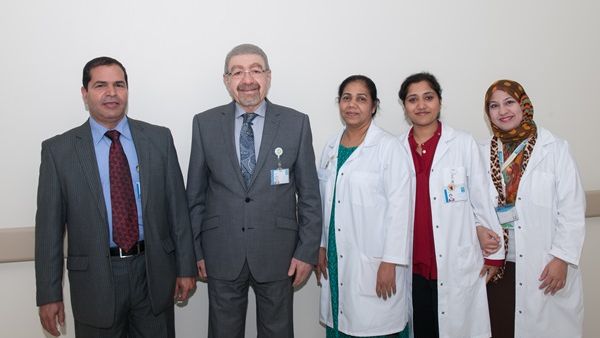Women’s Hospital’s Internationally recognized clinical teams help miracle baby defy the odds and survive

With the help of the multidisciplinary team in the Neonatal Intensive Care Unit (NICU) at Women’s Hospital, a baby born with life-threatening complications was given a second chance at life.
Women’s Hospital was recently recognized for its commitment to a collaborative approach to quality and safety in patient care by the acclaimed healthcare quality body, the Joint Commission International (JCI). This took place as part of its reaccreditation of Hamad Medical Corporation’s (HMC) eight hospitals.
Baby Amal was born at 40 weeks gestation with a birth weight of 2.9 kilos and diagnosed with congenital diaphragmatic hernia, a congenital malformation (birth defect) of the diaphragm. Deemed fragile from the first few seconds of life, she was intubated on a mechanical ventilation machine and struggled for survival.
Amal’s herniated bowel loops were occupying the left side of her chest and spleen, pushing her heart and she suffered from a collapsed right lung which increased her dependency for mechanical ventilation. To make matters worse, she was also diagnosed with a heart defect (patent ductus arteriosus) on the second day after birth as a result of developing pulmonary hypertension further adding to her medical instability.
Heavily reliant on mechanical ventilation and in very critical condition, Amal was not fit for surgery. The NICU team was forced to inform her parents that their firstborn had little to no chance of survival.
“Amal was on full life support, her condition was so bad that we believed there was no hope. Her doctors informed us that they could try and operate, but in order to do so, Amal would have to come off full life support and try and breathe on her own. It was a big risk, but our baby was so fragile that we knew we could lose her either way,” said Amal’s mother.
Baby Amal was transferred to the operating theater so that Women’s Hospital medical team could repair her congenital diaphragmatic hernia. After lowering her life support to perform the surgery, Amal’s oxygen saturation levels went dangerously low for two to three hours. Believed to be her last hours of life, Amal suddenly improved stability allowing doctors to operate. Amal’s surgery was successful and her condition relatively improved.
“Fortunately, baby Amal continued to fight. She was medicated, intubated and despite experiencing episodes of vomiting, was off oxygen support which was a huge achievement. Along with routine care provided by the NICU nurses, it was now imperative that we involve our occupational therapist to assess the baby’s feeding function and our physiotherapist to help the baby with mobility of her arms and legs. Their job is to involve the mother in their treatment in order to help build a stronger bond between mother and child,” said Dr. Hilal Al Rifai, Women’s Hospital Medical Director and Director of its Neonatal/Perinatal Services on behalf of his team.
Dr. Al Rifai said the hospital’s multidisciplinary approach is embedded in experience and evidence and this has resulted in an improvement in the delivery of services and care to each patient.
“This kind of intensive treatment that we have been able to provide for baby Amal can often mean the difference between life and death,” Dr. Al Rifai said.
“Getting that care right and ensuring that every member of the clinical team knows what to do and when is therefore essential. It is also something that the JCI, who this week gave their coveted gold seal of approval to Women’s Hospital and HMC, have recognized as being excellent. This is something that we are very proud of.
“Each day, we see the positive impact we have on the lives of the patients we treat and their families and having that commitment recognized by the JCI, is a clear signal that we are adopting the right approach,” Dr. Al Rifai added.
“Amal is my first born and at the beginning, I had no idea what to do. I didn’t think she would know I was her mother and I was terrified to hold her because at times she was so unstable that if moved even slightly, she would become unwell. I was encouraged by the NICU team to spend time with my baby girl to help her forget her painful experiences and heal,” said Amal’s mother.
The NICU’s multidisciplinary team made up of an occupational therapist and physiotherapist worked with Amal’s mother to continue to coach her on feeding and improving the baby’s physical strength. Gradually, baby Amal successfully achieved her developmental milestones and recognized her mother as a source of happiness and comfort. More than four months after birth, baby Amal continues to visit Women’s Hospital for regular follow-ups and get assistance with oral feeding through the Feeding and Swallowing clinic. She lives happily at home with her family and continues to show daily improvements.
“Being discharged with my baby was the happiest day of my life. I cannot thank the NICU team at Women’s Hospital enough for all the support they provided to me. By teaching me how to improve her condition, they empowered me to be an integral part of her successful recovery,” added Amal’s mother.
Background Information
Hamad Medical Corporation
Hamad Medical Corporation (HMC) is the main provider of secondary and tertiary healthcare in Qatar and one of the leading hospital providers in the Middle East.
For more than four decades, HMC has been dedicated to delivering the safest, most effective and compassionate care to all its patients.






